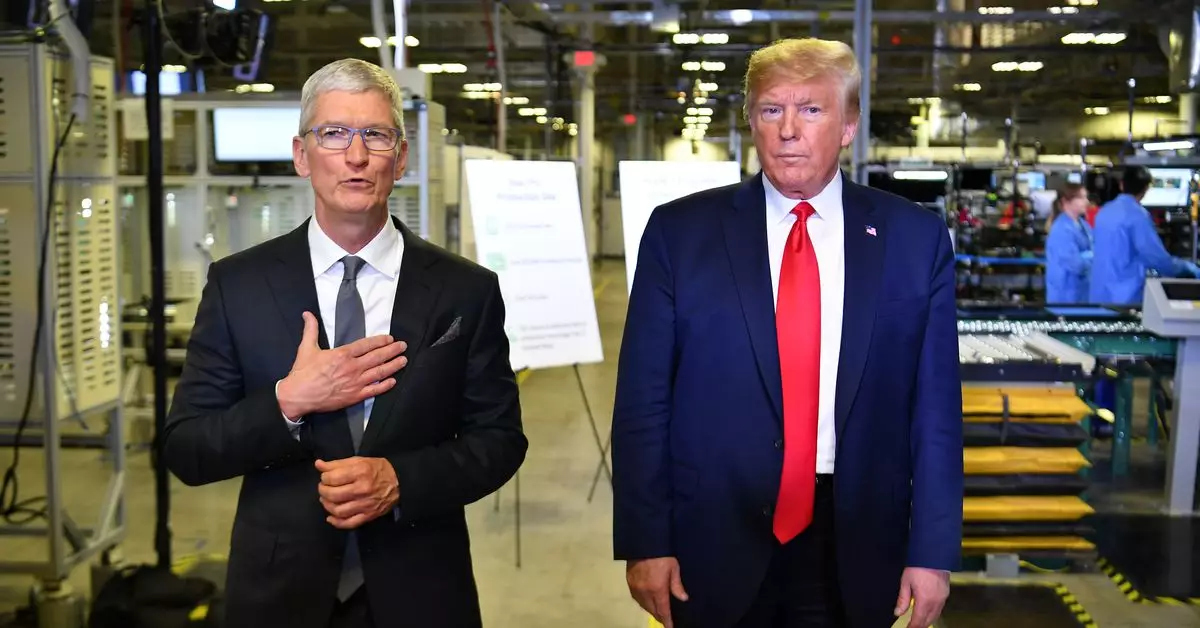In an era where the relationship between government entities and large corporations is under constant scrutiny, the alliance formed between Apple CEO Tim Cook and former President Donald Trump during the latter’s first term serves as a fascinating case study. Unlike many of his peers in the technology sector who struggled to establish any meaningful rapport with the administration, Cook successfully navigated this complex landscape through a combination of personal engagement and strategic simplicity. This highlighted an unorthodox approach to influence that raises questions about the intersection of corporate interests and political power.
As reported by sources, Cook’s strategy was rather straightforward: instead of relying on lobbyists or government relations teams, he chose to engage directly with Trump through phone calls and personal dinners. This direct line of communication allowed Cook to both influence policy outcomes and foster a personal rapport with the President. Through this strategy, Cook was able to advocate for favorable tax policies and urge the reduction of tariffs, securing advantages for Apple that other firms could not replicate.
Moreover, the manner in which Cook presented his case was crucial. Rather than overwhelming Trump with a barrage of data or multifaceted arguments, Cook adopted a more focused strategy. By honing in on a single, compelling data point, he effectively kept discussions straightforward and aimed at specific outcomes. This approach not only facilitated clearer communication but also likely made it easier for Trump to grasp the implications of the discussions.
The successful partnership between Cook and Trump can largely be attributed to their ability to identify and leverage mutual interests. Cook’s strategy involved aligning Apple’s goals with Trump’s agenda, a tactic that ensured that each meeting was productive for both parties involved. This form of collaboration raises an important consideration: when corporate leaders pursue relationships with political figures, aligning interests can be a pathway to wielding influence.
Interestingly, Cook’s interactions were not without their ethical dilemmas. Trump’s claims of being responsible for the establishment of an Apple plant in Austin were left unchallenged by Cook, raising questions about the responsibilities of corporate leaders in maintaining truthfulness in public discourse. Such compromises may be seen as a necessary evil in the pursuit of favorable policies, yet they contribute to a broader dialogue about the ethical implications of corporate lobbying.
Lessons for Other Corporate Leaders
In the wake of Cook’s adeptness in navigating the complexities of political relationships, other corporate leaders, including those from Boeing and FedEx, appear eager to adopt similar tactics. The desire of tech executives to flatter and engage with Trump—a figure renowned for his dramatic presidency—illustrates a significant shift in how tech giants view their roles in national discourse.
However, in seeking to replicate Cook’s methods, they must tread carefully. While direct communication may yield benefits, it also has the potential to compromise corporate integrity. The fine line between influence and manipulation must not only be acknowledged but respected. As leaders in technology continue to seek political alliances, they must ensure that their actions align with ethical standards while delivering on both business needs and societal expectations. Ultimately, Cook’s approach serves as a powerful reminder of how personal engagement and a focus on shared goals can redefine corporate-political relationships in a world that demands accountability on all fronts.


Leave a Reply
You must be logged in to post a comment.